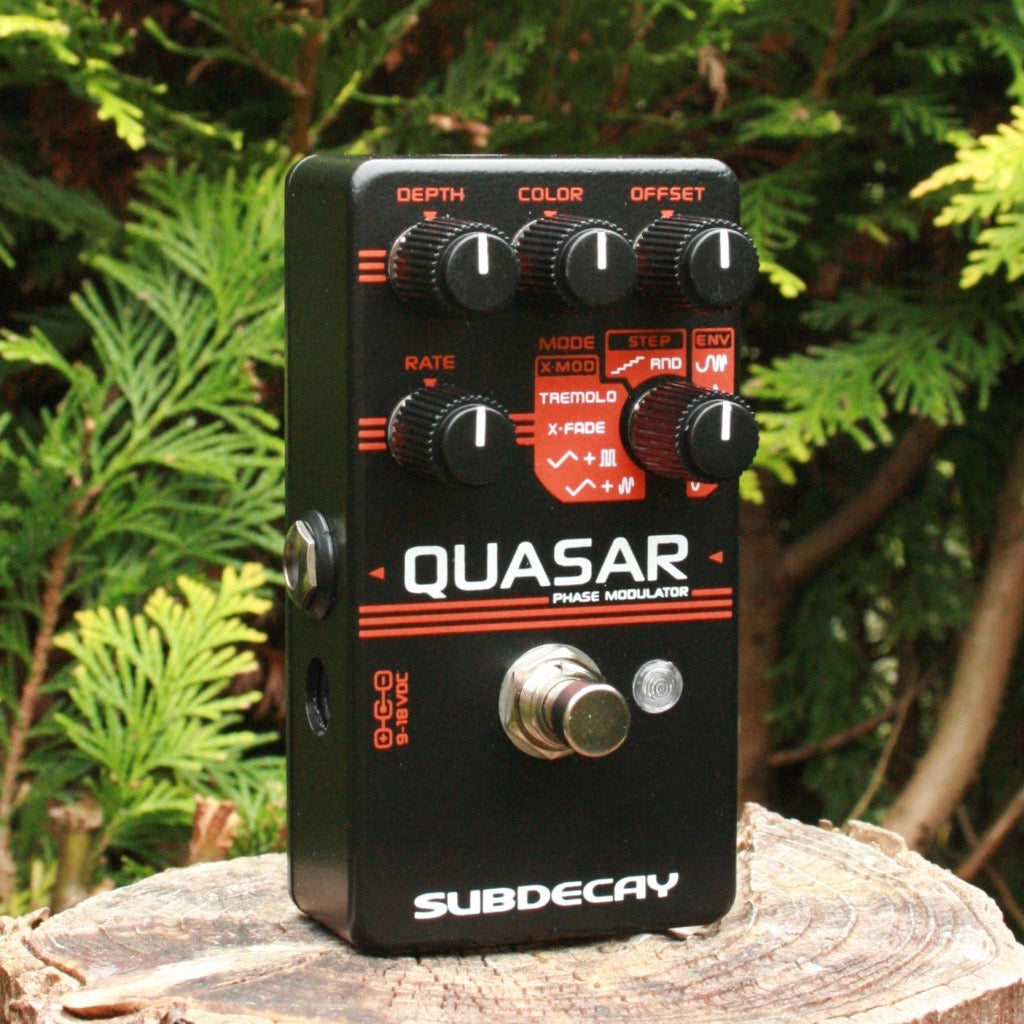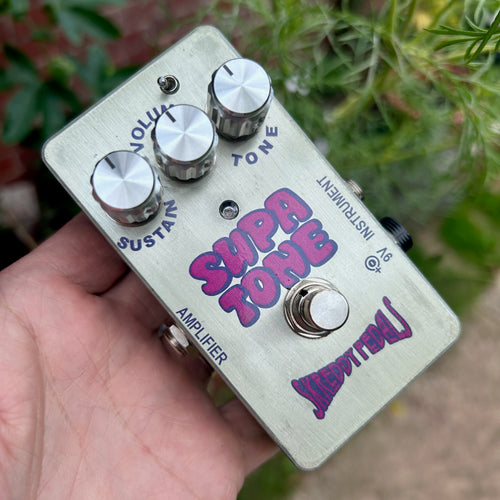Effects: Modulation, modulator, Phaser, Synth
Multi-mode Phaser
The Quasar v4 offers eleven modes paired with a simple control surface. An abundance of non-traditional options are on tap. Rhythmic modulation patterns. Sci-fi discombobulation. Envelope speed control.
Traditional phaser and rotary tones are in the box too, but you want more, right? Something different? Something that stands out?
All analog phaser.
Synchronized tremolo and chopper effects.
Active volume regulation. This eliminates the drastic volume disparities typical of many phasers.
Wide range of traditional and experimental sounds.
Subdecay has been designing and building Quasar phasers since 2005. For the new Quasar we explored new territory. We love defying effects conventions and breaking the rules. The Quasar’s next evolution is here and we’ve built in so much more than before.
Many of the new features are normally only found in fully digital effects. A wide variety of options are under your control. Pairing the analog and digital world together means there’s no compromise of analog headroom or that organic swirl that digital units just can’t match.
Modes & Controls:
In most modes the controls do what you’d expect. The offset knob is the exception. The offset knob is mode dependent. It sets anything from the phaser sweep center point to synchronized modulation ratios.
Rate: Always controls modulation speed.
Depth: Controls modulation depth.
Color: Usually controls phaser resonance. In mode 5 it controls a portamento function.
Mode: Set to any of the eleven modes. Modes are broken down into four categories:
1-4 Cross modulation (X-MOD)
5-6 Step Sequencing (STEP)
7-8 Envelope (ENV)
9-11 Traditional
X-MOD:
Cross modulation is our fancy way of saying the effect is modulated two different ways at the same time.
1 & 2 -Triangle + Sine & Triangle + Square:
The phaser is modulated by a slow triangle LFO and a faster Sine or Square wave LFO.
Offset: Sets LFO ratio to 2, 4, 8, 16 or 32.
3 – X-Fade:
A cross fade effect. This is kind of like when the radio DJ fades out from one song and into the next one, but instead this crossfades the phaser effect and the clean signal.
Offset: Controls how often the effect crossfades over each cycle of the phases. Set to a ratio of 2, 4, 8, 16 or 32.
Depth: Controls the cross fade depth.
4 – Tremolo:
Synchronized phaser and tremolo.
Offset: Sets tremolo ratio to 2, 4, 8, 16 or 32.
Depth: Controls tremolo depth.
Step Sequencer:
Rather than traditional smooth phasing these modes create rhythmic phaser/filter patterns.
5 – Step Pattern:
A stepping pattern based on a triangle waveform.
Offset: Sets how far steps skip ahead on the triangle waveform creating repeating patterns.
Color: Portamento control. Turn to the left to soften step patterns. Turn all the way to the left and modulation will smoothly glide from each step to the next step creating a myriad of unique wave forms.
6 – RND:
Random Phaser sequencer with volume chopper (square wave tremolo)
Offset: controls how long the volume is chopped per step. (0 – 50%)
Envelope modes:
Modulation is manipulated by touch dynamics.
7 – Envelope speed control:
A phaser effect where the modulation speed is altered by playing dynamics. (Similar functionality to our Vagabond Tremolo, and (discontinued) Siren Vibrato.)
Offset: slows down or speeds up modulation when you hit the guitar strings.
8 – Envelope Phaser:
Similar to an envelope filter… but with a phaser.
Offset: Controls phaser resting point.
Depth: Controls how much playing dynamics modulate the phaser (just like an envelope filter.)
Rate: Controls envelope attack and decay speed.
Traditional:
9 – Rotary / Vibrato:
Inspired by the long discontinued DOD FX22 with a deceptively huge range going from straight tremolo or vibrato, to very present filter/phaser tones.
Offset: Controls tremolo depth.
Color: Turn to the right for resonance. Turn to the left for a pitch vibrato effect.
10 – Slow Triangle LFO:
Long linear phaser sweep perfect for slow speeds.
Offset: controls center point of modulation.
11 – Fast Sine LFO:
A faster phaser using a sine wave LFO.
Offset: controls center point of modulation.




